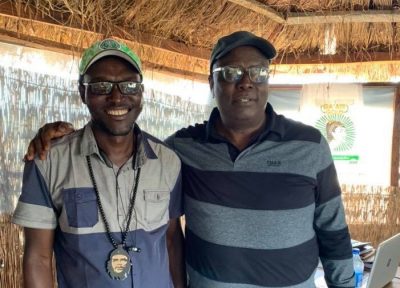From Militant to Farmer: The Inspiring Story Of Reston Tadheke

On Saturday, 28 September, I visited a farm initiative by a young Nigerian in Keffi, Nasarawa State. I couldn’t belief what I saw. Reston Tedheke’s story is inspiring and a good model for young people in our country who are daily facing challenges of survival.
This is more so when Reston is a former militant from the Niger Delta. He has found a home in this farm settlement and he is giving hope to the villagers who in turn are showering him with love and affection.
Reston moved to Ga’ate, a village in Nassarawa in 2017 and began a farm settlement with N1.5m. Today he is employing 500 Nigerians on the farm and cultivates rice , maize , yam , beans , melon etc . He is also raising turkey, cattle and rams on a 3000 hectares of land.
According Mr Olajide Abiola , the MD of Kiakia Ltd, a microcredit company who started him off with the initial fund, Reston is now doing close to a billion Naira business yearly.
Reston told me on Saturday that regrettably the Nigerian banks have failed him. Several applications and loan processing have not yielded any assistance. He is however finding solace in crowd funding companies . One of these companies is formerly managed by Mr Tunji David and Mike Oluwagbemi of Owonikoko Farms
Many other young men are also pitching in funds to ensure that Reston is able to expand and acquire more facilities for rice processing and animal husbandry.
The Nigeria Farmers’ Group and Cooperative Society (NFGCS) is an organization which engages in the production, processing and distribution of agro products with the attendant vision of helping Nigeria achieve food sufficiency. Established in February 2017, NFGCS has partnership with the communities in the Hadari Emirate District, especially Ga’ate, Marke, Mante, Sabon Gida – that serve as our host communities, established a Farm Settlement Village where, according to the group, “we carry out the activities of crop production, animal husbandry and processing of rice into a popular rice brand, the Ga’ate Gold.”
It went further: “We have in our employ, 500 indigenes of these Host Communities who work in various sections of the Farm, with 67% of them women. We also have empowered over 2,000 Local Farmers with seeds, agro-chemicals, equipment, and technological transfer. This we do because we believe that achieving the vision of farming to feed Nigeria is a collaborative effort.
“In crop production, we produce such crops as maize, melon, rice, soybeans, beniseed, ginger, yam and all high valued food crops that are consumed locally. We are also looking into Kenaf Production and processing. In Animal Husbandry, we have a ranch with about 500 cattle and sheep, with another 500 turkey birds. Our ranch is managed by the Local Fulani Villages within the Farm. We have a ten-hectare section where we have planted the Ruzi grass and which are open not just to our animals but to the 17 local Fulani Settlement within the Farm Settlement Village. We believe that our model can be used across Nigeria to curb the spate of Farmers-Herders Conflicts. For over two years of operations, we have not had any issue with the Local Fulani Villages or any neighboring farmers.
“We recently acquired the Friesian Bulls and Sokoto Gudali with the aim of cross breeding them for high milk production. With the focus of the Government to localize production, NFGCS has positioned itself to utilize all the opportunities within the Agricultural Value Chain. Our target is to attain 100,000 litres of milk production per day in the next three years, and then invest in the processing of this milk to useable consumer products.”
Also, NFGCS currently has obligation to supply 150 trucks of Cattle to abattoirs within Southern Nigeria specifically Lagos, Asaba and Osun States monthly. A single truck contains between 30 to 33 Bulls. Beef is the most common source of animal protein in Nigeria with Lagos State alone requiring 8,000 heads of cattle daily. NFGCS currently supplies about 15 trucks monthly. Going forward, NFGCS plans to develop a Cattle Fattening Program where 2,500 heads of cattle can be fattened in 90 days until they attain optimum weight of 450KG before transporting them to the Abattoirs in the South. The Cattle Fattening Program will complement, as group put it, “our Cattle Supply Program hence ensuring that there is no question of available market to handle the fattened bulls.” NFGCS currently sources for bulls from major cattle markets along the Border of Nigeria and Niger Republic in states like Jigawa, Sokoto and Yobe States.
NFGCS currently processes rice into local, destoned, unpolished brown rice which is sold to the market under the brand name, Ga’ate Gold in honor of the community the Farm Settlement Village is located. “Our current processing capacity is 10 tons per day however, there is need to increase our capacity as the monthly demand for our rice from Distributors is 124,000 bags of 50KG rice, it said, adding, “We have designed an outline for expansion which will ensure that we meet up with this demand, especially as the borders have been closed to rice importation.”
The opportunities inherent in the Agricultural Sector in Nigeria are enormous. With a population of over 200 million and a land space of 50 million arable hectares of farmland capable of growing anything, Nigeria can and should be in the position to feed the world. NFGCS recognizes these opportunities and it said “with our experience in playing in the sector, we are open to partnerships to explore fully any and all opportunities within the Agricultural Value Chain.”
-Senator Babafemi Ojudu is a Special Adviser on Political Affairs in the Presidency







